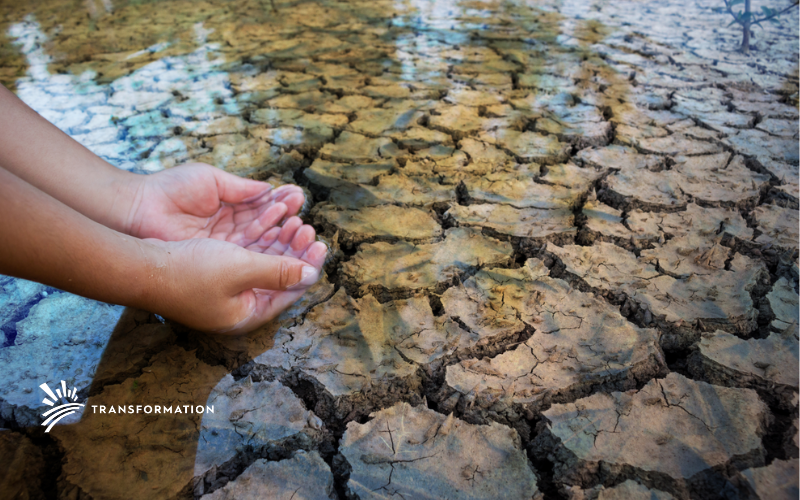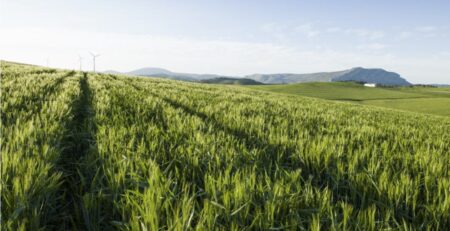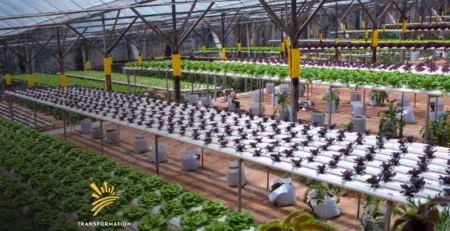Drought Signals the Need for Sustainable Agriculture
Global temperatures are on the rise and extreme weather events continue to put pressure on natural resources. While some countries have embraced adaptation methods — like sustainable agriculture — as a measure against climate change, others lag behind in both knowledge and available capital to transition agricultural production systems away from unsustainable levels of water usage.
The world we live in is considered 71% water, but this doesn’t change the fact that the supply of freshwater is still limited. The primary reason is that the most significant percentage of this water is salty, leaving the percentage of freshwater needed for human use and economic activities less. Water is one of the natural resources economically used in the production, distribution and consumption process, meaning any deficit results in destructive results in the global economy.
Agriculture is the largest water user worldwide, with 70% of freshwater being used for irrigation. This means that water supply is essential in the agriculture sector, and any impact on its collection would significantly affect the primary production sector. Access to clean water and combating hunger are among the Sustainable Development Goals (SDGs) that the world aims to achieve, among others.
How do environmental pollution and degradation impact freshwater supply?
Environmental conservation and proper utilization and conservation of resources are vital in achieving the global water supply. It results in sustainable production and production and boosts resource efficiency, ultimately boosting economic growth. By 2050 the increasing population may mean thrice the number of resources we have on this planet would be required for sustainability. If we do not conserve our environment or utilize resources well without waste or environmental degradation, we will experience the supply of limited resources needed to serve the surplus population. When human activities are not aimed at environmental conservation, we allow contaminants to reach freshwater sources. This contamination does not only pose a problem to human health but also affects living things, including other plants and animals. This means that farming becomes affected, and the general agricultural sector is at risk. Therefore, water microbiological quality has been an issue, and treating this water by chlorination has not been 100% effective.
How do freshwater supply impacts sustainable agriculture?
Agriculture is a vital sector as it carries the primary production of goods needed for general industrial use. Water is a crucial factor in the whole farming process and determines raw materials and food supply. Therefore, for quality and healthy products to be produced, it starts with agriculture. However, the trend shows that pollution and freshwater depletion are alarming, which means that the risk in sustainable agriculture would impact the manufacturing and industrialization process. This cannot be assumed because it will have an economic impact from demand and supply of goods and services to employment issues. The supply has also been alarming over time, and the factors leading to this should be addressed.
Here are some of the factors that have impacted freshwater supply globally.
- Contamination and pollution by household users, manufacturers and the general public have been the leading cause. This includes the release of contaminants such as chemicals to water bodies to earth degradation and soil contamination which holds groundwater.
- Lack of proper measures to address the issue and bring a solution. Most of the stakeholders are just pointing fingers without taking responsibility for causing the problem.
- Increased global focus on industrialization and urbanization without addressing the local issues from agriculture to the importance of environmental conservation.
How freshwater supply relates to industrialization and how they both impact each other.
The recent water scarcity has raised the attention of governments, business people, the general public and all the stakeholders involved in environmental matters. Water as an essential commodity is not only affecting the production sector but also the manufacturing process. Every industry, especially food companies, requires freshwater to produce quality and clean products in the production chain.
However, the industry sector is also associated with impacting the supply through pollution and depletion. Even though other factors such as irrigation and livestock farming could be the primary cause of this depletion, the industrialization trend over time is also alarming and a factor that cannot be assumed whatsoever. Therefore, industrialization dramatically depends on water supply, and the sector is also responsible for all activities related to the scarcity and for taking measures necessary to conserve this essential resource. The industrialization has also contributed to climate change.
This is a significant factor as it affects the general composition of nature, and factors such as air pollution, land degradation, and soil and water pollution have significantly impacted nature and climate patterns. This means farming has become an issue due to unpredictable changes, leading to low-quality products in the market and affecting the manufacturing sector.
Final remarks.
- Drought has resulted in food wastage leading to increased hunger.
- Industrialization and farming play a key role in ensuring water conservation and utilization to enhance freshwater supply.
- The current trend requires planning strategies and input of government and environmental bodies to address the importance of clean water, conservation and measures needed to achieve this.
- water is free but requires input resources to conserve and ensure it serves its purpose.
- Soil and land degradation, environmental pollution and poor ecological conservation impact the freshwater supply.
- Freshwater is essential to enhance sustainable agriculture and achieve all the SDGs as it plays a crucial role in the global economy.
- If measures are not taken in resource conservation, the world is at risk of having food and economic crisis now and in future.
Join Transformation Holdings LLC in developing sustainable agriculture understanding in order to look at renewable resources and sustainable options, while still improving your bottom line.




Leave a Reply